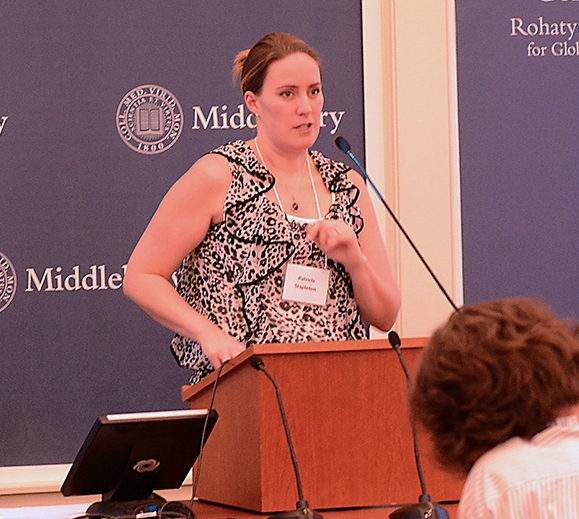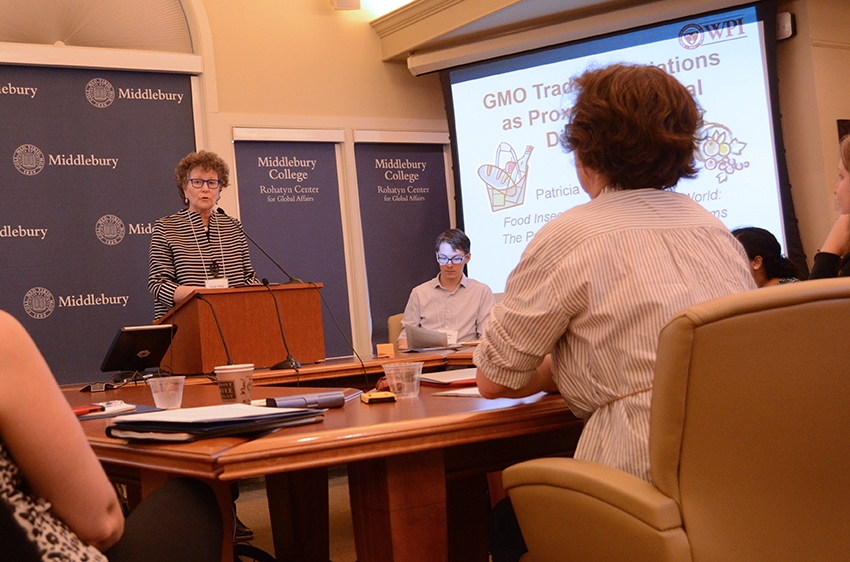Rohatyn Center's Annual Conference Examines Food Insecurity

MIDDLEBURY, Vt. – Food insecurity in a globalized world was the subject of a probing three-day interdisciplinary conference at Middlebury College’s Rohatyn Center for Global Affairs (RCGA), March 10-12, 2016.
Seventeen guest scholars and members of the Middlebury faculty examined the persistent problem of world hunger and malnutrition within the contexts of agriculture, war, race, migration, government, ecology, and social class. Over the three-day conference, discussions crossed borders like climate change, GMOs, and biodiversity, and examinations of issues specific to nations like Kenya, Cuba, Vietnam, Mexico, Japan, Nicaragua, and the United States.
The annual international and interdisciplinary conference “showcases all aspects of the center’s mission in ways that individual lectures cannot,” said Professor Tamar Mayer, the director of the RCGA, at the opening session.
Any discussion about the world’s food situation “should include a critical analysis of the cultures and politics that inform different food systems,” Mayer said. “We must probe the fundamental questions of who eats what, when, where, and why. Only by examining the power structure and governance systems that have produced food insecurity in different locations around the world, and in different geographical scale, will we be able to fully address the problem of food insecurity in the long run.”
The opening speaker at the conference, Worcester Polytechnic Institute’s Patricia Stapleton, quickly set the stage for the complexity and nuance of global food challenges. She compared the United States to the European Union in terms of policies pertaining to genetically modified organisims (GMO), food labeling, and so-called “novel foods,” which are defined by the European Commission as “newly developed, innovative food” or “food produced using new technologies and production processes.”
In her talk titled “GMO Trade Negotiations as a Proxy for Cultural Differences,” Stapleton maintained that negotiations about GMOs “serve as proxies for conflicting cultural and social perceptions about food, hunger, and risk”; and asserted that U.S. standards toward GMOs have an adverse effect on food security by concentrating the power among multinational food conglomerates.
Also at the opening session, Harry Konstantinidis, an assistant professor of economics at the University of Massachusetts-Boston, said austerity programs in Greece over the past five years have reduced access to food for large segments of the Greek population. He discussed new movements around food in Greece, including the rise of urban gardens, farmers’ markets, and community-supported agriculture, and posed the question: “Is it possible to rebuild the agricultural and food sectors within Greece’s current framework of government?”

On the second day of the conference, three scholars looked at the impact of social and interpersonal dynamics on food access in a session titled “Socially Constructed Vulnerability and Food Insecurity.”
Birgit Schmook of El Colegio de la Frontera Sur (Mexico) discussed her research on the chronic malnourishment of 23 percent of Nicaragua’s population. She said that despite some improvement over the last few decades, large-scale changes in land ownership after the Sandinista revolution have left rural citizens without access to private or communal farming land, leaving them in a vulnerable position in terms of food access.
Ashanté Reese, assistant professor of anthropology and sociology at Spelman College, used ethnographic and archival data to explore the historic connections between race and the drastic reduction of grocery stores in a northeastern Washington, D.C. neighborhood. The physical and social isolation that served the predominantly black neighborhood well in the early 20th century when subsistence farming was possible, she said, has created vast food deserts as a result of the disappearance of both farming and supermarkets.
Focused on a very different part of the world, Adam Gilbertson, a postdoctoral fellow at the University of North Carolina, Chapel Hill, described his research on the effects of food-insecurity on intra-households ills, such as domestic violence, in Kenya’s Mombasa slums. Hunger equates to both pain and shame, Gilbertson noted, which causes a slew of serious problems within households and relationships.
Turning to food security in Vermont, UVM graduate student Jessie Mazur presented her findings to the question: Why are migrant workers in the state’s food industry going hungry? Using data from the USDA’s Huertas project, in-depth interviews, and field observations, Mazur exposed some of the hidden barriers encountered by farm workers trying to access food, prepare it, and share it together.
Mazur was paired on a panel with Colleen Hammelman, a Ph.D. candidate at Temple University, who spoke on the subject of “Insecure Urban Foodscapes” by contrasting the experiences of migrant women in two cities: Medellín, Colombia, and Washington, D.C. In both locales, Hammelman said, migrant women employ complex strategies to cope with their lack of transportation, unsafe neighborhoods, shortage of funds, and unreliable food sources to deal with food insecurity.
Middlebury faculty members Molly Anderson (food studies), Ellen Oxfeld (sociology/anthropology), and Paula Schwartz (French) also made presentations at the 2016 conference titled “Food Insecurity in a Globalized World: The Politics and Culture of Food Systems.”
Previous topics for the Rohatyn Center’s annual conference have included the 2015 forum on millennium development goals, 2014 gathering on youth unemployment, and 2013 conference on the politics of fresh water.

